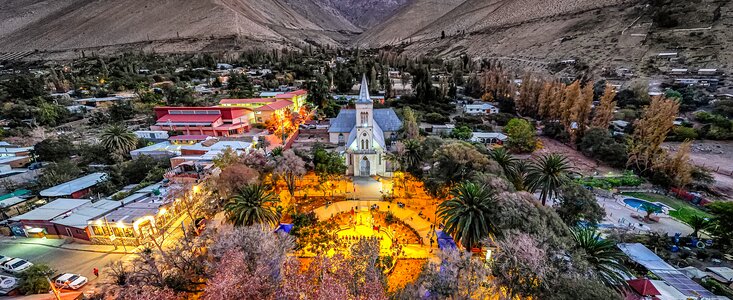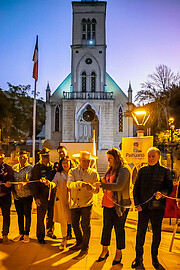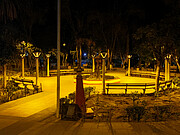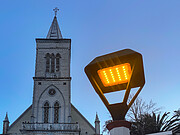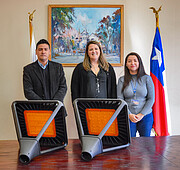New, Dark-Sky-Compliant Lighting, Courtesy of AURA in Chile and NSF NOIRLab, Installed in Pisco Elqui Square
First Public Space in Chile’s Coquimbo Region to Comply with New National Lighting Standards
13 June 2023
AURA and NSF’s NOIRLab in Chile have donated to the Municipality of Paihuano a new, dark-sky compliant lighting system for the Pisco Elqui main square. This is the first lighting project in the Coquimbo Region to comply with the new dark-sky lighting standards that will be adopted soon.
The 22 new compliant light fittings have been installed and were switched on as part of a World Environment Day fair held in the square. The Mayor of Paihuano, Hernán Ahumada, AURA's Head of Mission in Chile, Alejandra Voigt, the AURA Deputy Director, Hernán Bustos, and the councilors of Paihuano and other local authorities were in attendance.
At the fair local entrepreneurs who promote caring for the environment, as well as other local institutions, were visited by students and residents of the area. NOIRLab astronomer, Roque Ruiz, gave a talk on the protection of the dark sky before the new lights were turned on.
“Our goal is to continue taking care of the skies of the Elqui Valley. We are very grateful to AURA [for the donation] because it allows us to protect the night skies now, and it will protect them for future generations,” Mayor Hernán Ahumada said. “We call on our neighbors and the authorities to take care of the skies and to continue carrying out this type of action.”
“AURA in Chile, together with NOIRLab, wanted to make this donation to Paihuano to help it meet its commitment to protecting the dark-sky ecosystem and supporting astronomy and astro-tourism,” said Voigt. “We hope that Pisco Elqui square will serve as an example of a well-lit public square that also complies with the dark-sky regulations.”
The lighting project in Pisco Elqui square was developed by experts from the Office for the Protection of the Quality of the Northern Skies of Chile (OPCC) to provide optimum illumination that allows better visibility while saving electricity, all in a safe public space.
The new lighting elements, which have a specialized amber filter that removes virtually all light from the blue part of the spectrum, were developed to meet the light-pollution regulations of the Canary Islands, which are also an important center for astronomical research. These guidelines were first developed by the Technical Office for the Protection of Sky Quality of the Instituto de Astrofísica de Canarias and later adopted by Chile.
In addition to its spectral component, this technology has specialized optical characteristics that allow for uniform illumination, in accordance with the revised Public Lighting Regulations of the Ministry of Energy.
OPCC also confirmed that these new light fixtures will use only one third as much electricity as the existing high pressure sodium bulbs and approximately half of the electricity of high-efficiency LED light bulbs.
More information
NSF’s NOIRLab (National Optical-Infrared Astronomy Research Laboratory), the US center for ground-based optical-infrared astronomy, operates the International Gemini Observatory (a facility of NSF, NRC–Canada, ANID–Chile, MCTIC–Brazil, MINCyT–Argentina, and KASI–Republic of Korea), Kitt Peak National Observatory (KPNO), Cerro Tololo Inter-American Observatory (CTIO), the Community Science and Data Center (CSDC), and Vera C. Rubin Observatory (operated in cooperation with the Department of Energy’s SLAC National Accelerator Laboratory). It is managed by the Association of Universities for Research in Astronomy (AURA) under a cooperative agreement with NSF and is headquartered in Tucson, Arizona. The astronomical community is honored to have the opportunity to conduct astronomical research on Iolkam Du’ag (Kitt Peak) in Arizona, on Maunakea in Hawai‘i, and on Cerro Tololo and Cerro Pachón in Chile. We recognize and acknowledge the very significant cultural role and reverence that these sites have to the Tohono O’odham Nation, to the Native Hawaiian community, and to the local communities in Chile, respectively.
Links
Contacts
Charles Blue
Public Information Officer
NSF NOIRLab
T: +1 202 236 6324
Email: charles.blue@noirlab.edu
Luz María Aguirre
Head of Communications and Institutional Relations
AURA in Chile
Cell: +56 9 98714645
Email: LAguirre@aura-astronomy.org





